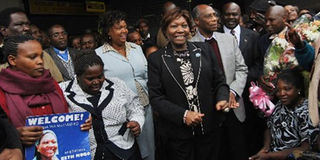Experts warn on rising cases of cancer

Public Health and Sanitation Minister Beth Mugo is received by family members and friends on arrival from USA on July 29, 2012 where she was receiving treatment on breast cancer. Photo/ANTHONY OMUYA
Health experts on Monday sounded the alarm over increased cases of cancer, which kills 7,300 people every day, translating to 7.6 million deaths globally.
Speaking at an event to mark World Cancer Day at the Pan Afric Hotel in Nairobi, Public Health and Sanitation minister Beth Mugo said cancer caused more deaths than HIV/Aids, malaria and tuberculosis combined.
“This makes it the world’s second leading cause of death after cardiovascular diseases and it is projected the deaths are expected to rise to over 11 million by 2030,” she said.
In Kenya, cancer ranks third among the biggest killers after infectious and cardiovascular diseases, contributing seven per cent annually.
“Over 28,500 new cases of cancer are diagnosed each year while the disease kills 22,100 people annually with more than 60 per cent below 70.
“It is sad that over 70 per cent of cases are diagnosed at advanced stages,” said Mrs Mugo in a speech read on her behalf by the director of public health, Dr Shanaaz Shariff.
The leading killers
The minister identified breast, cervical and throat cancers as the leading killers in women, with the breast and cervical types having the highest incidence rate of 23.4 and 20.0 per 100,000 women, respectively.
“In men, throat and prostate cancer and Kaposi sarcoma are the most common, with an incidence rate of 17.5; 15.2 and 9.2 per 100,000 men respectively,” Mrs Mugo said.
Mrs Mugo is among prominent personalities who made public her battle with breast cancer while her Medical Services counterpart, Prof Anyang’ Nyong’o was treated for prostate cancer.
Mrs Mugo said the enactment of the Cancer Prevention and Control Act (2012) will improve awareness about the causes, consequences and means of prevention and control of the disease.
“Cancer is not just a health issue. It has wide-reaching social, economic and human rights implications,” she said.
Mrs Mugo said a third of most common cancers can be prevented and this was the most cost-effective of reducing cancer in the long-term.
“Preventive measures include avoiding harmful use of alcohol and tobacco, adopting healthy eating habits and frequent exercise,” she said.
Speaking at the event, Prof Nyong’o said although the cost of treatment was “enormous” the two ministries would strive to overcome this challenge.
“We will continue collaborating with donors and the World Health Organisation to ensure the Act on guidelines for cancer treatment is implemented,” he said.
A colon cancer survivor, Mr Abdul Aziz, urged society not to stigmatise cancer victims.
Mr Aziz, who was diagnosed with cancer six years ago, urged victims to accept their fate after they are diagnosed.
WHO Kenya representative, Dr Custodia Mandhate, said an estimated 12.4 per cent of African region’s 804 million inhabitants will develop cancer before the age of 75.
“The risk increases with age and 90 per cent of cases will occur after the age of 40.
“If we act now, we can save about 100,000 lives annually by 2020,” Dr Mandhate said.
Dr Mandhate said about 40 per cent of cancer deaths could be prevented if the disease is diagnosed early while a significant number of cancers can be cured by surgery, radiotherapy or chemotherapy.




